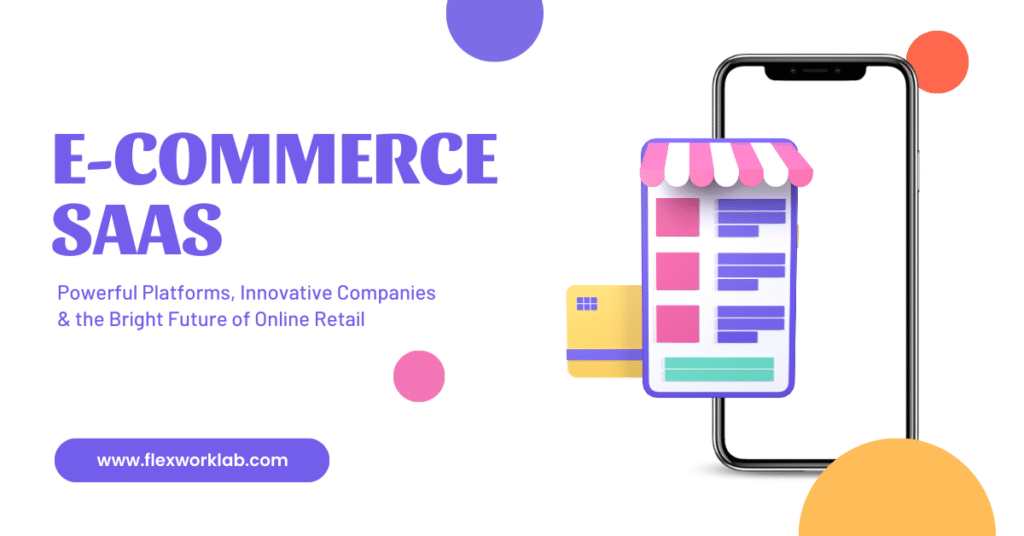
Introduction
The surge of e-commerce has revolutionized global retail markets and presented substantial business growth opportunities for entrepreneurs and companies. According to Statista, the worldwide e-commerce market is projected to exceed $8 trillion by 2027 as more consumers adopt online shopping.
Managing an online store requires handling various tasks beyond updating product listings and serving customers support services. Businesses require a platform that offers dependable service and strong security measures while allowing room to expand as they grow. This is where SaaS ecommerce comes in.
The SaaS approach includes cloud-based software solutions that deliver complete tool sets for establishing and running an online store. Businesses can establish their online stores fast with SaaS ecommerce platforms by avoiding expensive infrastructure costs and the need for specialized technical knowledge.
This article examines SaaS ecommerce platform essentials and business adoption advantages as it reviews leading platforms and provides guidance for selecting the most suitable platform based on specific business requirements.
What Is SaaS E-commerce?
SaaS Explained in Simple Terms
Software applications through SaaS become available over the internet without the need for local installation on servers or devices. Businesses must pay regular fees to gain access to the software services offered by the platform through its subscription model. Users can focus on their work without dealing with technical issues because the SaaS provider handles updates and security alongside maintenance tasks.
SaaS platforms in e-commerce supply the necessary resources to establish, operate, and expand online shops. Business operations, including inventory management as well as customer relations, together with payment processing and shipping logistics, are controlled through a unified dashboard. SaaS ecommerce enables businesses to concentrate on their growth and sales because the platform manages all technical aspects.
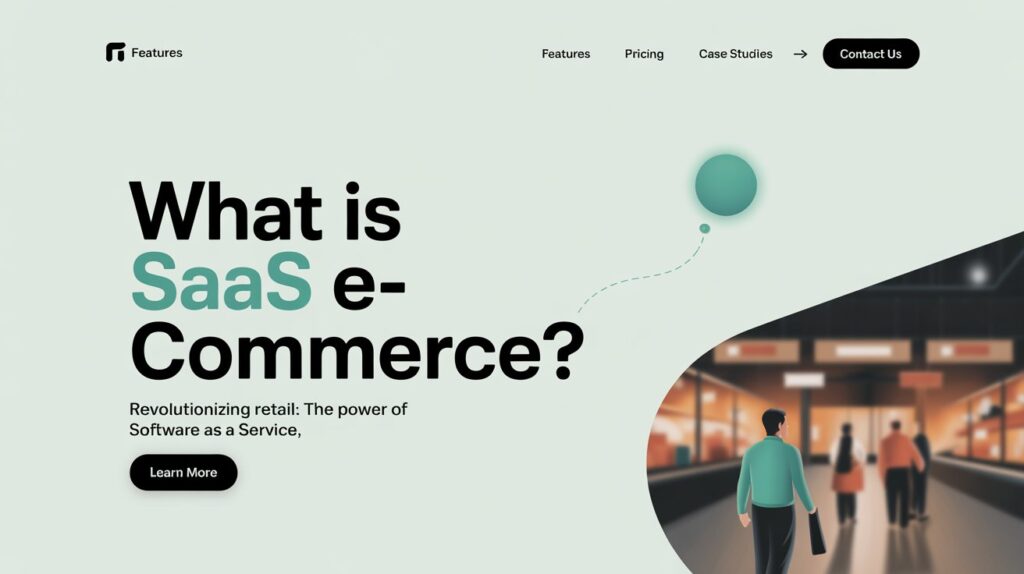
How SaaS Applies to E-commerce
SaaS ecommerce platforms serve as complete systems that enable merchants to both create and oversee their online shops through a single interface. Merchants can access their stores through a web browser from any location at any time since these platforms work in the cloud.
Key features often include:
- Payment Gateway Integration: The system uses built-in connections to payment gateways such as PayPal and Stripe and multiple credit card networks for secure customer payments.
- Mobile-Responsive Design: The platform enhances your store for mobile usage to respond to the growing shift toward mobile-first shopping experiences.
- Marketing Automation: The platform offers management tools for specific email communications and social media activities while integrating SEO techniques.
- Customer Support and Analytics: The platform features built-in tools that enable businesses to monitor customer activity and handle service tickets while gathering actionable insights.
SaaS ecommerce platforms give businesses access to advanced technology without their IT teams having to build or maintain it.
Benefits of SaaS for E-commerce Businesses
SaaS ecommerce provides multiple strong benefits to teams who adopt it:
- Cost-Effectiveness: You pay a predictable monthly or annual fee instead of hiring developers and purchasing servers and infrastructure. A custom-built e-commerce platform usually requires more financial resources compared to implementing an existing SaaS solution.
- Speed to Market: It takes only hours to days to launch a store on a SaaS platform, while developing a custom store demands several months. The solution’s fast deployment abilities allow companies to quickly enter new markets and launch new products.
- Scalability: SaaS ecommerce platforms expand alongside your business operations. A SaaS ecommerce platform allows you to add products and enter new markets or upgrade features without worrying about infrastructure constraints.
- Maintenance-Free: SaaS providers take care of system maintenance, software updates, security patches, application, and performance monitoring. Your store maintains uninterrupted operation because it doesn’t depend on internal technical knowledge.
Why E-commerce Businesses Choose SaaS Platforms
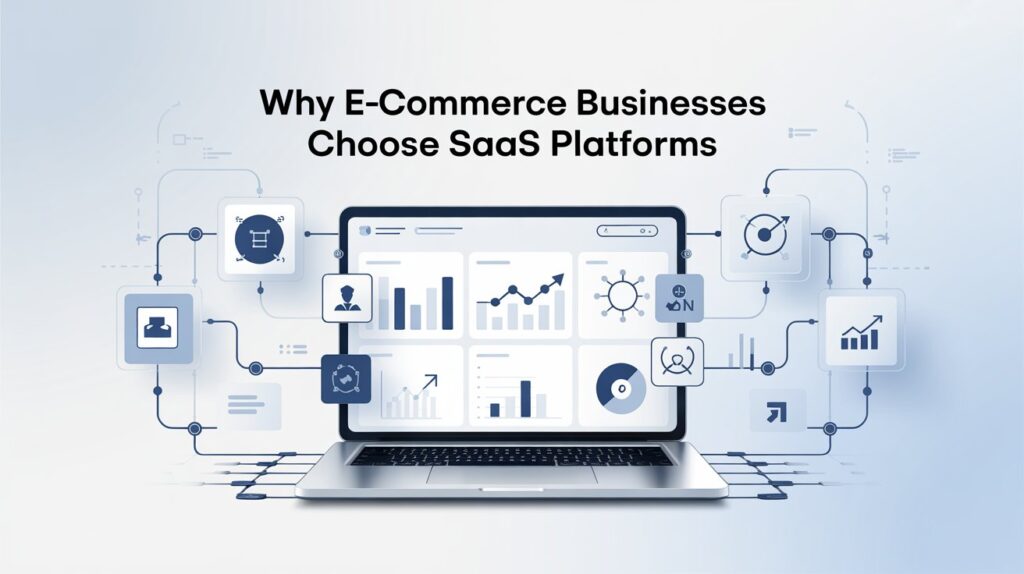
Speed to Market
The speed at which products reach the market stands as the fundamental determinant of success in modern e-commerce operations. Entrepreneurs and businesses need to introduce products quickly to keep customers engaged because competitive forces remain constant.
SaaS platforms remove technical setup delays from the e-commerce development process. Pre-built templates alongside drag-and-drop builders and intuitive dashboards enable users to launch a complete operational store within just a few hours. Through multi-channel integration, SaaS platforms enable businesses to begin selling on social media platforms such as Instagram or Facebook and marketplaces like Amazon right away.
Lower Technical Barriers
The construction of an e-commerce store previously required in-depth technical understanding and specialized skills. To develop an e-commerce store, you require skills in coding and server management and knowledge of different intricate web development components. SaaS platforms eliminate technical obstacles for users. SaaS solutions focus on non-technical end users to enable business owners to concentrate on products and marketing instead of backend technicalities.
Example:
Owners of custom t-shirt businesses typically lack coding abilities. With Wix or Squarespace, users can build appealing online stores without needing technical skills.
Regular Feature Updates & Security
E-commerce businesses must keep their security patches and features current because the industry moves quickly.SaaS platforms ensure your online store remains up-to-date through automatic system updates that introduce new features and protect against security risks.
The merchant saves both time and effort as manual update installations and complex system maintenance tasks become unnecessary.
Example: Shopify releases periodic updates to provide businesses with new capabilities for enhanced AI product recommendations and advanced fraud protection that enable them to maintain a competitive advantage.
Built-in Marketing, SEO, and Analytics Tools
Most SaaS platforms maintain essential business growth support by integrating built-in marketing tools as a fundamental feature. This includes tools like:
- SEO optimization: You can enhance your search rankings by utilizing customizable metadata options alongside auto-generated sitemaps and Google Analytics integrations within your SEO tools.
- Email marketing automation: Automate email marketing campaigns with follow-up email sequences to retrieve abandoned shopping carts.
- Social media integration: Integrated tools allow businesses to sell products directly through Instagram, Facebook, and TikTok platforms.
- Advanced reporting: Detailed sales, traffic, customer behavior reports, and more provide valuable information for making business decisions.
Top SaaS E-commerce Platforms Powering the Future of Online Business
The substantial increase in available SaaS solutions makes the selection process challenging. The following list highlights leading SaaS ecommerce platforms:
| Platform | Key Features | Best For |
| Shopify | The platform offers user-friendly operation alongside a vast app marketplace and social media integration capabilities. | Small to large businesses, dropshipping |
| BigCommerce | Headless commerce, multi-channel selling, flexible B2B/B2C support | Growing businesses, wholesalers |
| Squarespace | Elegant templates, all-in-one solution | Creatives, boutique businesses |
| Wix eCommerce | Drag-and-drop builder, customizable templates | Entrepreneurs, small businesses |
| Adobe Commerce | Deep customization, AI-powered features, enterprise-grade support | Enterprises with complex needs |
1. Shopify
Shopify has become the go-to option for merchants who need a fast-growing online store solution. A wide variety of businesses, from startups to large corporations, choose this platform because of its easy installation procedure combined with its diverse app offerings and powerful features. The Shopify platform combines inventory control and payment processing tools with marketing features into an integrated, user-friendly dashboard interface.

Case Study: Shopify serves as the platform that enables Allbirds to handle its global e-commerce operations for its sustainable footwear line. Allbirds achieved a 33% revenue boost annually thanks to Shopify’s scalable platform and its seamless integration with their global distribution system.
2. BigCommerce
BigCommerce ranks among the best SaaS ecommerce platforms that provide powerful tools for businesses aiming to expand. Businesses can benefit from BigCommerce’s headless commerce support, along with advanced product catalog management options and strong B2B capabilities through multi-channel selling functionality.
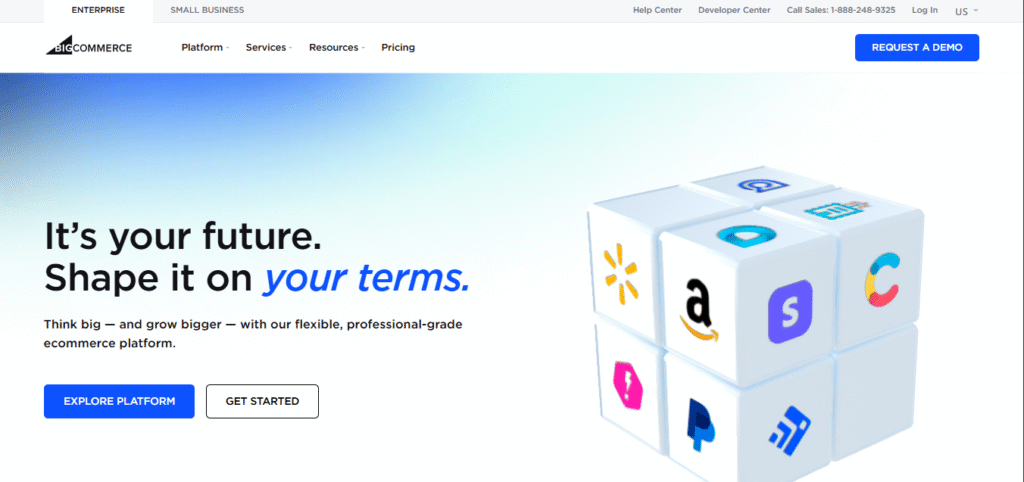
BigCommerce offers strong integration capabilities with platforms like Amazon and eBay, making it optimal for businesses seeking to expand their online store operations and requiring enhanced customization.
Statistical Data: Businesses operating on BigCommerce report an average conversion rate improvement of 22% due to functionalities such as abandoned cart recovery and support for multiple currencies, along with flexible shipping choices.
3. Squarespace Commerce
Squarespace wins creative users over with its impressive designer-quality templates. Originally designed as a site-building tool, the platform now allows merchants to sell both physical and digital goods alongside memberships and services through e-commerce functionality.

The contemporary design style of Squarespace earns acclaim because it suits artists, boutique owners, and photographers equally well.
4. Wix eCommerce
The Wix eCommerce service functions within the larger Wix platform ,which stands out for its user-friendly drag-and-drop website creation tool. Businesses can establish custom online stores via this platform without extensive technical expertise, which makes it ideal for small to mid-sized eCommerce enterprises.
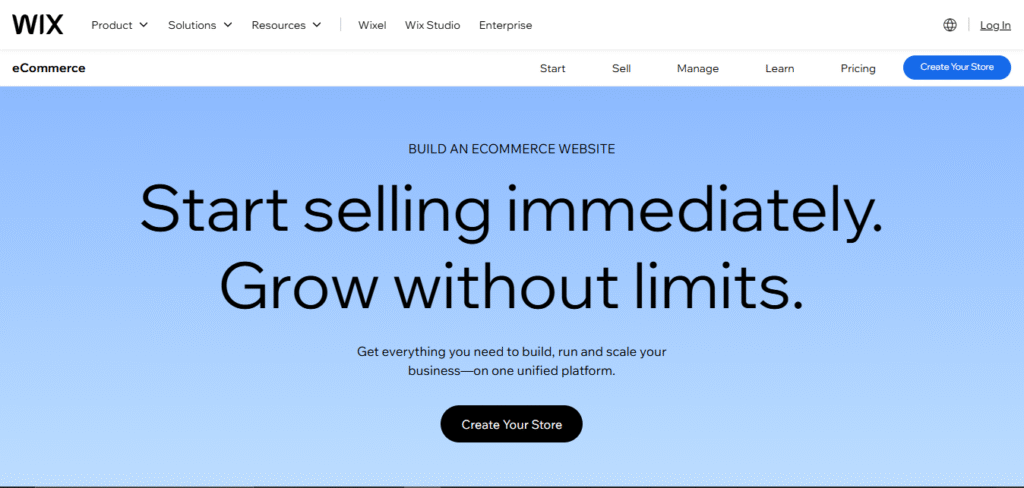
Key Features:
- 900+ customizable templates
- Wix Editor and Wix ADI (AI-powered design)
- Integrated dropshipping via Modalyst and Printful
- Multichannel sales (eBay, Facebook, Instagram)
- Automated tax, shipping, and inventory management
What Sets It Apart:
Wix provides advanced business automation features, including automated emails alongside loyalty programs and abandoned cart recovery within a user-friendly dashboard. Through its Wix Payments service, businesses can streamline payment transactions without needing third-party gateway configurations.
Case Study:
The inclusive sizing fashion brand Copper Union utilized Wix eCommerce to establish its online store with custom design and narrative elements. The founder successfully expanded their community and handled production and customer engagement through a single dashboard.
5. Adobe Commerce (Magento)
Adobe Commerce, formerly known as Magento Commerce, delivers enterprise-level solutions through its flexible eCommerce platform, which supports wide-ranging scalability and customization options. Adobe Commerce utilizes an open-source framework along with Adobe Experience Cloud integration to provide unmatched flexibility for organizations that manage complex systems beyond standard SaaS solutions.
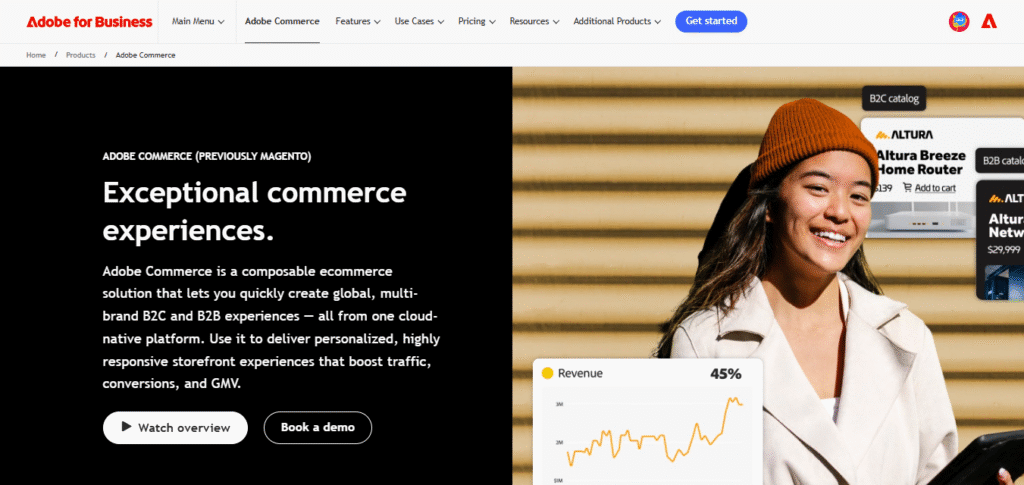
Key Features:
- Highly customizable via open-source infrastructure
- AI-powered product recommendations
- The solution delivers advanced B2B functionality, including quotes management, requisition lists creation, and company account handling.
- Multi-site and multi-language support
- Real-time data and analytics with Adobe Sensei
Best For:
Large enterprises, along with high-growth brands and B2B eCommerce operations, require total control over their design logic and performance capabilities.
Statistical Data:
Adobe Commerce users see customer engagement rise by 25% and conversion rates improve by 10% after they implement AI personalization and advanced segmentation tools.
Case Study:
The global outdoor brand Helly Hansen operates over 30 websites in multiple countries and languages through Adobe Commerce. The company achieved both consistent localized shopping experiences and global operational efficiency improvements through this approach.
Leading E-commerce SaaS Companies Shaping the Industry
The SaaS e-commerce sector expansion has led multiple leading players to emerge as shapers of the marketplace.These companies create platforms that simultaneously drive innovation in future online retail models.
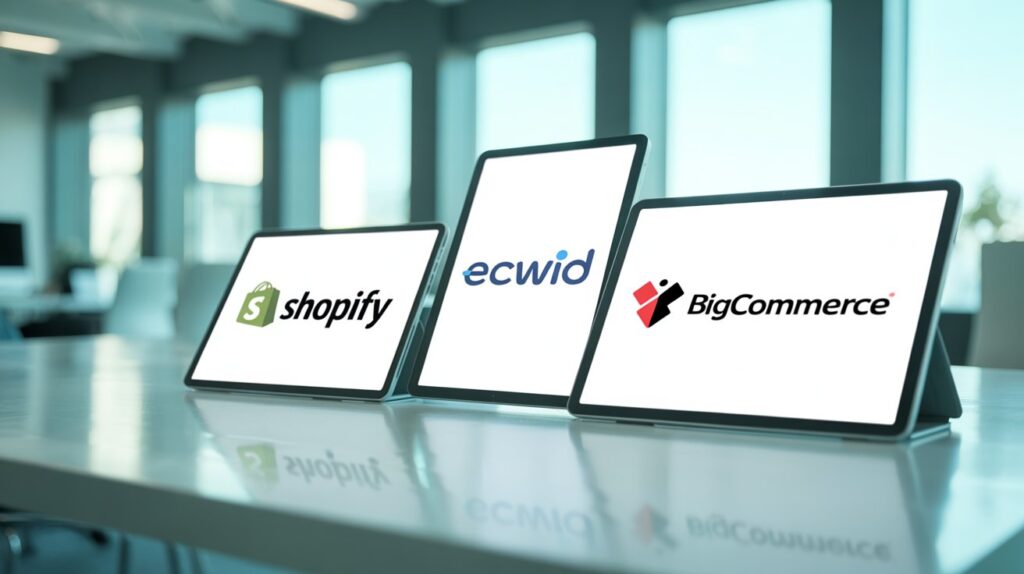
- Shopify: Shopify remains the top choice for merchants while growing its user base to over 1.7 million active users. The platform helps entrepreneurs grow their e-commerce business through versatile tools that support sales operations across online platforms, together with physical stores and mobile interfaces.
- BigCommerce: BigCommerce enables major brands such as Ben & Jerry’s and Toyota to develop scalable online stores for global operations. Its commitment to adaptable multi-channel solutions has attracted businesses with sophisticated requirements to the platform.
- Ecwid: Ecwid provides new market entrants with online store solutions that expand their customer base by linking seamlessly to their websites and social media platforms alongside major marketplaces.
How to Select an Appropriate SaaS E-commerce Platform for Your Business
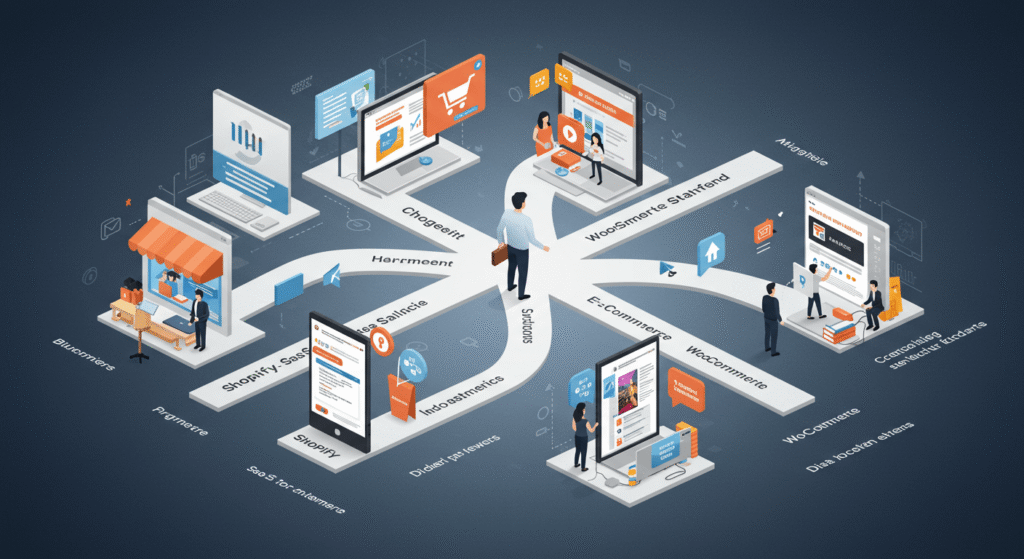
Choosing the right platform stands as a crucial factor in reaching successful outcomes. Here are a few factors to consider:
- Ease of use: Is the platform user-friendly for non-technical users?
- Customization: To what extent can the platform allow you to modify its design aspects and functionalities to match your brand guidelines?
- Integrations: Is platform integration possible for your essential apps, along with your services and marketplaces?
- Support and community: Does the platform provide readily available customer support, and does it feature community forums alongside documentation and resources?
Case Study: The pet supply giant Petco moved to BigCommerce to accommodate its expanding business operations. Petco experienced a 50% decrease in product update time and achieved operational streamlining by utilizing multi-channel selling and inventory management capabilities available through BigCommerce.
Final Thoughts on the Future of SaaS E-commerce

SaaS ecommerce represents the inevitable direction of online retail rather than a temporary trend. The e-commerce industry will experience ongoing development because more businesses are switching to SaaS platforms, which bring new features, automation capabilities, and integration options.
SaaS platforms deliver all essential business tools for success while eliminating the complex challenges found in standard e-commerce solutions. Startups and established brands both gain the ability to scale and grow while reaching global customers through SaaS ecommerce platforms.
The development of artificial intelligence alongside automation technologies and machine learning enhancements suggests strong growth prospects for SaaS ecommerce platforms. Upcoming platforms will deliver improved personalization tools together with easy integration features and better analytical insights to help businesses succeed in competitive markets.
FAQs
What is a SaaS ecommerce platform?
A SaaS ecommerce platform functions as a cloud service offering necessary tools and features for building and running scalable online stores. Subscription-based platforms remove the requirement for technical maintenance.
Is Shopify a SaaS ecommerce company?
Yes. Shopify operates as one of the top SaaS ecommerce platforms, supplying extensive features to establish and control online stores.
How does business performance improve when using e-commerce SaaS platforms?
These platforms provide primary advantages through initial cost reduction and user-friendly design while offering fast setup processes alongside automated updates and built-in marketing tools.
Can SaaS platforms support large-scale online stores?
BigCommerce and Adobe Commerce platforms possess specialized capabilities to manage high-volume transactions, which makes them perfect for expanding businesses.
How do SaaS ecommerce companies make money?
Businesses pay SaaS ecommerce companies through monthly or yearly subscription fees. They implement extra revenue models, including transaction fees and premium add-ons.

